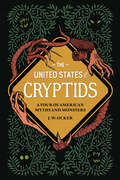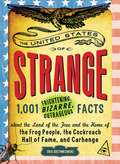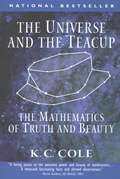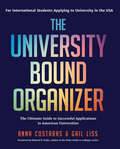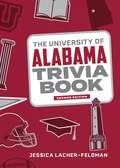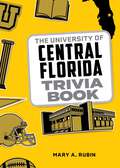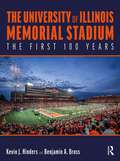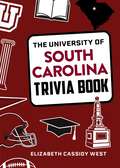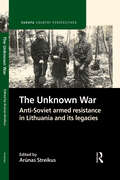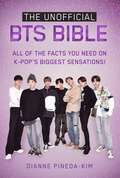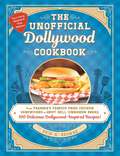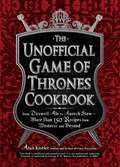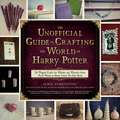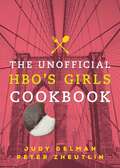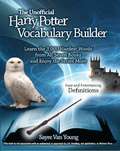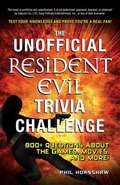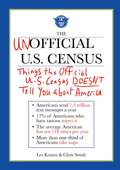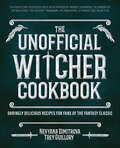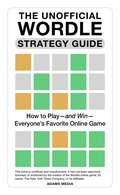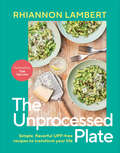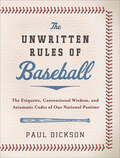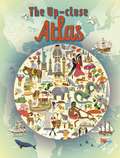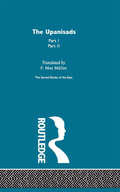- Table View
- List View
The United States of Cryptids: A Tour of American Myths and Monsters
by J. W. OckerMeet the monsters in our midst, from bigfoot to Mothman and beyond!Welcome to the United States of Cryptids, where mysterious monsters lurk in the dark forests, deep lakes, and sticky swamps of all fifty states. From the infamous Jersey Devil to the obscure Snallygaster, travel writer and chronicler of the strange J. W. Ocker uncovers the bizarre stories of these creatures and investigates the ways in which communities embrace and celebrate their local cryptids. Readers will learn about: • Batsquatch of Washington, a winged bigfoot that is said to have emerged from the eruption of Mount Saint Helens• Nain Rouge of Michigan, a fierce red goblin that has been spotted before every major city disaster in Detroit• Flatwoods Monster of West Virginia, a robotic extraterrestrial that crash-landed in rural Appalachia• Lizard Man of South Carolina, a reptilian mutant that attacked a teenager in the summer of 1988• Glocester Ghoul of Rhode Island, a fire-breathing dragon that guards a hoard of pirate treasure• And many more! Whether you believe in bigfoot or not, this fully illustrated compendium is a fun, frightening, fascinating tour through American folklore and history, exploring the stories we tell about monsters and what those stories say about us.
The United States of Strange
by Eric GrzymkowskiLife, Liberty, and the Pursuit of All Things Weird Sure, you probably know that George Washington was our first president and that Christopher Columbus accidentally discovered America in 1492, but did you know that there are more plastic flamingos in the United States than there are real ones and that Disneyland employees were not permitted to wear their own underwear while dressing in character until 2001? Behind the portrait of America that history classes, news reports, and boring documentaries have painted lies a strange and perplexing country that you couldn't imagine even in your wildest dreams. Featuring 1,001 shocking facts, this book reveals all the secrets and weirdness that you never knew about the United States. From the thirty-two(!) bathrooms in the White House to the fact that a single U. S. 'made hamburger may contain meat from 100 different cows, these wacky tidbits will guarantee that you'll never look at this nation the same way again!
The United States of Strange
by Eric GrzymkowskiLife, Liberty, and the Pursuit of All Things Weird Sure, you probably know that George Washington was our first president and that Christopher Columbus accidentally discovered America in 1492, but did you know that there are more plastic flamingos in the United States than there are real ones and that Disneyland employees were not permitted to wear their own underwear while dressing in character until 2001? Behind the portrait of America that history classes, news reports, and boring documentaries have painted lies a strange and perplexing country that you couldn't imagine even in your wildest dreams. Featuring 1,001 shocking facts, this book reveals all the secrets and weirdness that you never knew about the United States. From the thirty-two(!) bathrooms in the White House to the fact that a single U.S.-made hamburger may contain meat from 100 different cows, these wacky tidbits will guarantee that you'll never look at this nation the same way again!
The United States of Strange: 1,001 Frightening, Bizarre, Outrageous Facts About the Land of the Free and the Home of the Frog People, the Cockroach Hall of Fame, and Carhenge
by Eric GrzymkowskiLife, Liberty, and the Pursuit of All Things WeirdSure, you probably know that George Washington was our first president and that Christopher Columbus accidentally discovered America in 1492, but did you know that there are more plastic flamingos in the United States than there are real ones and that Disneyland employees were not permitted to wear their own underwear while dressing in character until 2001?Behind the portrait of America that history classes, news reports, and boring documentaries have painted lies a strange and perplexing country that you couldn't imagine even in your wildest dreams. Featuring 1,001 shocking facts, this book reveals all the secrets and weirdness that you never knew about the United States. From the thirty-two(!) bathrooms in the White House to the fact that a single U.S.–made hamburger may contain meat from 100 different cows, these wacky tidbits will guarantee that you'll never look at this nation the same way again!
The Universe And The Teacup: The Mathematics of Truth and Beauty
by K. C. ColeFilled with “a thousand fascinating facts and shrewd observations (Martin Gardner, Los Angeles Times), this “beguiling and lucid book” (San Francisco Chronicle) demonstrates how the truth and beauty of everything, from relativity to rainbows, is all in the numbers. Line drawings.
The University Bound Organizer: The Ultimate Guide to Successful Applications to American Universities
by Anna Costaras Gail LissFor international students: the only book you’ll ever need to guide you through the US college and university admissions process.University admissions in the United States is tougher than ever. Nearly three million students are expected to enroll as first-time freshmen in colleges and universities in the United States this school year. How can you prepare, get organized, and stay focused throughout the search and admission process?Applying to university can be intimidating and overwhelming for both teens and parents. The process is a maze of standardized tests, school research, university fairs, applications, interviews, CVs, essays, and deadlines. This university planner will guide you easily through each stage and includes tips to help you submit your best application.The University Bound Organizer helps students:Understand what US admission officers are looking for in an applicantPrevent common mistakes students make on their applicationsBuild a personal profilePlan an individualized testing scheduleResearch universities to identify schools that are a good fitDevelop a balanced list of schoolsSecure letters of recommendationComplete and submit applications accurately and on timeDevelop their university application essayApply for financial aid and scholarshipsAce interviewsSort and manage application resultsMake a final decision
The University of Alabama Trivia Book (College Trivia)
by Jessica Lacher-FeldmanThe unofficial guide to the home of the Crimson Tide!Originally published in 2007, The University of Alabama Trivia Book has been updated with a wealth of new and recent facts about the home of the Crimson Tide. Over 700 questions (with answers!) and quotations span the nearly 200-year history of UA, ranging from the fun to the significant, and from the bizarre to the informative. This book is the quintessential source of information about Alabama&’s oldest and largest public university, perfect for current and prospective students, alumni, college sports fans, and Tuscaloosans in town and all over the world.Updates include facts related to much-beloved football in the Nick Saban era, interesting statistics and sports records, and some fascinating faculty trivia, bringing new stories and names to light. Discover obscure facts, forgotten lore, and exciting tidbits about everything from student life and traditions to Town and Gown, including:Who was the first woman to earn a law degree at UA?What are the origins of "Big Al"?What year did the football team start wearing hard helmets?When was air conditioning first installed on campus?And much more!
The University of Central Florida Trivia Book (College Trivia)
by Mary A. RubinThe unofficial guide to the home of the Knights! The University of Central Florida Trivia Book features a wealth of historic and recent facts, with over 650 questions (with answers!) and quotations spanning more than six decades of UCF history, ranging from the fun to the significant, and from the bizarre to the informative. This book is the quintessential source of information about one of the nation's largest and fastest-growing universities, perfect for current and prospective students, alumni, college sports fans, and UCF Knights in town and all over the world.Discover obscure facts, forgotten lore, and exciting tidbits about everything from famous alumni and groundbreaking research to student life and traditions, including:Who was the first football game against?What was the shuttle on campus called in 1993?When did the Spirit Splash ducks first appear?Where did the Citronaut debut?Why do most of the phone numbers on campus begin with 823?And much more!
The University of Illinois Memorial Stadium: The First 100 Years
by Kevin Hinders Benjamin BrossThis book offers a rigorous but graphically compelling narrative historic analysis of one of the most important civic buildings not only of the University of Illinois Urbana-Champaign, or the State of Illinois, but arguably of the United States, Memorial Stadium.Like all spatial products, the design and construction of the University of Illinois Memorial Stadium embodies the social, political, economic, aspiration, and aesthetic values of its time. This book will engage in critical analysis including documenting the civic discourse that led to the Stadium and thereafter explore the iterative nature of the Stadium in shaping civic discourse. In this vein, central topics include its role in embodying the state’s economic growth; the changing nature of the sociocultural tendencies and its impact on campus life and the University’s community; the Stadium’s effects on UIUC sports and the campus’ built environment; the rise of College sports as big business; and the impact on mass culture across the State and the country, like the use of stadiums as concert venues and place of public discourse. More than a simple study of the building’s conceptualization, design, and construction, this book reveals why Illinois’ Memorial Stadium is an iconic part of the American Midwest’s built landscape and in many ways part of the American mythic landscape.This will be interesting reading for all those familiar with the building, as well as all students and scholars of sports architecture.
The University of South Carolina Trivia Book (College Trivia)
by Elizabeth Cassidy WestThe unofficial guide to the home of the Gamecocks!The University of South Carolina Trivia Book features a wealth of historic and recent facts, with over 500 questions (with answers!) and quotations spanning more than two centuries of USC history, ranging from the fun to the significant and from the bizarre to the informative. This book is the quintessential source of information about the University of South Carolina, perfect for current and prospective students, alumni, Gamecock sports fans, and locals.Discover obscure facts, forgotten lore, and exciting tidbits about everything from student life and traditions to Town and Gown, including: What was the Great Biscuit Rebellion of 1852?Who was the first African American woman graduate?Which professor tried to expel a student for stupidity?What two traditions came out of the 1902 Carolina–Clemson riot?Which campus building served as a morgue?
The Unknown War: Anti-Soviet armed resistance in Lithuania and its legacies (Europa Country Perspectives)
by Arūnas StreikusThe armed anti-Soviet resistance movement which arose in the second half of 1944 in Lithuania, as Soviet forces began to reoccupy the Baltic countries and Galicia, sparking a nearly decade-long fierce military conflict, has yet to become established in the common narrative of contemporary European history. However, controversy regarding the nature of this `war after the war' and its legacies constitutes one of the core elements in the contemporary information warfare waged by Russia against its neighbouring countries. The origins of various distortions surrounding the story of the partisan war in the western borderlands of the Soviet Union can even be traced to the final stages of that war, when Soviet propaganda sought to discredit the campaign as a battle waged by criminal elements. In this example of a historical event charged with controversial memories and geopolitical connotations, a thorough academic approach is extraordinarily instrumental. Responding to the growing need for historical research capable of providing international readers with the latest findings in the thematic field under question, six scholars from Vilnius University address the diverse aspects of this phenomenon as well as its role in the culture and politics of memory. Toward this end, this analysis – among the most comprehensive explorations of this history to date – is being released in both Lithuanian and English.
The Unofficial BTS Bible: All of the Facts You Need on K-Pop's Biggest Sensations!
by Dianne Pineda-KimJoin BTS&’s ARMY and learn the history of the international K-POP sensation! BTS (aka Bangtan Sonyeondan) has become one of K-POP&’s most well-known singing groups. The seven-member Korean boy band formed in 2013 and has slowly grown to worldwide fame through their music. Despite slow beginnings, the K-POP group now has millions of listeners around the world. They led the Korean Wave of music into the United States in 2017, and as of 2019, they are the only Korean group to top the US Billboard 200, and the first group since the Beatles to have three number-one albums in less than a year. BTS is also known for breaking the mold of K-POP, including social topics such as mental health, individualism, and social commentary in their hip-hop lyrics. TIME Magazine named the Korean Pop group as one of the 25 most influential people on the internet and named them as one of TIME's 100 most influential people of 2019. In the BTS Bible, you&’ll learn everything you could want to know about the sensational singing group, including: Individual member profilesBand concept and styleHistory of their six-year rise to fameChart-topping songs and videosInterviews with worldwide fans and music expertsAnd more! Don&’t get left behind in the wake of the BTS success. Read all about the K-POP group that is changing the face of international music in the Unofficial BTS Bible.
The Unofficial Dollywood Cookbook: From Frannie's Famous Fried Chicken Sandwiches to Grist Mill Cinnamon Bread, 100 Delicious Dollywood-Inspired Recipes! (Unofficial Cookbook)
by Erin BrowneBring the fun of Dollywood right to your own kitchen with 100 of the most delicious foods from Dollywood and its surrounding parks.From favorite snacks and main dishes to refreshing drinks and popular desserts, Dollywood has some incredible food. And now, you can recreate all of your favorites—and discover some new favorites—with these 100 recipes in The Unofficial Dollywood Cookbook. You&’ll learn to make: -Frannie&’s Famous Fried Chicken Sandwich from Grandstand Café -Meatloaf Stackers from Granny Ogle&’s Ham &‘n&’ Beans -Fruity Pebbles Funnel Cakes from Crossroads Funnel Cakes -And much more! Perfect for everyone from Dollywood super fans who miss those familiar flavors in between trips to fans who have never visited but still want to experience the amazing food, The Unofficial Dollywood Cookbook has all the recipes you&’ll need to make treats worthy of Dolly Parton herself.
The Unofficial Game of Thrones Cookbook: From Direwolf Ale to Auroch Stew - More Than 150 Recipes from Westeros and Beyond (Unofficial Cookbook)
by Alan KistlerAn Epic Culinary Journey to the Heart of Westeros!Eat like a Lannister. Brew spirits to warm you in the coming winter. Treat guests to exotic sweets and alchemy-inspired cocktails. With this collection of hearty meals inspired by George R. R. Martin's A Song of Ice and Fire series, it's all possible! Every dish finds its roots in the pages that brought Westeros to life, including:Arbor Red Wine-the finest spirit in the Seven KingdomsThe House of Stark's Venison, Apple, Cheddar Plaits-savory meat pies, fit for any Warden of the NorthThe Imp's Wild Strawberry Fool-a dessert light enough to make Tyrion smileWilding Grilled Pork Chops with Stir-Grilled Apples-the meal of choice at Craster's KeepTears of Lys-the concoction of choice for bartenders and assassins alike Feast your imagination on entrees, desserts, snacks, and drinks that will make your fantasies a reality!
The Unofficial Guide to Crafting the World of Harry Potter: 30 Magical Crafts for Witches and Wizards—from Pencil Wands to House Colors Tie-Dye Shirts
by Jamie HarringtonCharming crafts even Muggles can make! You won't need alchemy or a magic wand to make these magical projects inspired by the world of Harry Potter. With a little Hogwarts creativity and the step-by-step guidance of this spellbinding book, you'll be able to transfigurate simple supplies and things around the house into everything from Remembrall Rings to Butterbeer Lip Balm to Nargles for your front lawn. You'll be as busy as Mrs. Weasley knitting her Christmas sweaters as you dive into dozens of Potterific projects. Relive the excitement of Harry's adventures with these genius crafts. Drop some homemade Pgymy Puff Bath Fizzies into the tub and pretend you're Moaning Myrtle. Keep memories of the Quidditch pitch close with your very own Golden Snitch Necklace. Or show off the Sorting Hat's selection with a House Colors Tie-Dye Shirt. Accio, crafting supplies--it's time for some wonderful wizardly fun!
The Unofficial HBO's Girls Cookbook
by Judy Gelman Peter ZheutlinEat and drink your way through New York with Hannah, Marnie, Jessa, and Shoshanna in The Unofficial HBO's Girls Cookbook. This e-book contains nearly two-dozen recipes connected to the HBO hit show Girls: Stop in at Café Grumpy and learn how to make a French press coffee the way Ray and Hannah would Recreate Jessa and Thomas-John's Foundry wedding cake, with buttercream icing made from local NYC rooftop honey Bake up the Salmagundi Club's chocolate chip cookies, like the one Hannah nibbles on after her cringeworthy reading at the prestigious art and literary association Try your hand at authentic pierogies from Christina's Polish Restaurant, a short walk from Hannah's Greenpoint apartment And more—from Brooklyn Pad Thai and Jessa's White Russian to BabyCakes Black-and-White Cookies and Baked Eggs Warwick Style It's the best way to get a taste of Girls' New York without paying for a plane ticket.
The Unofficial Harry Potter Vocabulary Builder
by Sayre Van YoungENJOY EVERY WORD OF HARRY'S ADVENTURELEARN 1,000s OF NEW VOCABULARY WORDSThe Harry Potter series takes readers on the greatest literary adventure of all time. However, as young readers tear through the seven books, they encounter thousands of new words. What should they do when facing an unknown word? Skip over it and miss that bit of the story-and also pass up the opportunity to learn the word's meaning? This fun and handy reference offers a better solution. It allows readers ages 8 - 14 to quickly find clear and accurate definitions of the more advanced English language vocabulary used in the Harry Potter series.The Unofficial Harry Potter Vocabulary Builder includes: Over 3,000 easy-to-understand definitions Entertaining sample sentences for every word Pronunciation key plus notes on usage 60 fun and wizardly illustrations Page reference in a Harry Potter book for each wordIncludes words from all seven books-Sorcerer's Stone, Chamber of Secrets, Prisoner of Azkaban, Goblet of Fire, Order of Phoenix, Half-Blood Prince and Deathly HallowsImportant note to readers: This book is an independent and unauthorized fan publication. No endorsement or sponsorship by or affiliation with J. K. Rowling, her publishers or other copyright and trademark holders is claimed or suggested.
The Unofficial Resident Evil Trivia Challenge
by Phil HornshawThe Ultimate Zombie-Fighting Challenge! You may think that you know everything there is to know about Alice and the Umbrella Corporation, but how much do youreallyknow? With topics that cover the entire Resident Evil franchise, you'll have to drop in on every fight, scene, and exchange in order to beat this trivia challenge. If you really want to prove that you're a Racoon City expert, get ready to put your skills to the test with questions like: Where does Alice's real name appear in the films? How long does it take to make a single dose of the Daylight vaccine? What role did the mansion play in World War II? The ultimate test of fandom, this book is guaranteed to challenge even the greatest Resident Evil fan!
The Unofficial U.S. Census: Things the Official U.S. Census Doesn't Tell You About America
by Les Krantz Chris SmithOn April 1, 2011, the Official 2010 U.S. Census Report will be released. On that same day, The Unofficial U.S. Census will shed light (and a bit of laughter) on all the other facts that Americans are itching to know about our country and each other. <P><P>Les Krantz and Chris Smith have collected facts from a variety of sources, compiling a fascinating and insightful look into America-an up-to-date demographic profile that will include what the government forgot to ask us, such as who we sleep with, what we ingest, what we own, what we drive, when we have sex, what we tattoo on our bodies, and much more! <P><P>With clever photos and captions, the book includes fifty enlightening and fun chapters covering all aspects of American life, including sporting activities, sex, edibles, education, religious beliefs, family profiles, criminal activities, body piercing, dating, driving, and net worth. <P><P>The Unofficial U.S. Census is an engaging portrait of America, jammed with facts and fun-warts and all!
The Unofficial Witcher Cookbook: Daringly Delicious Recipes for Fans of the Fantasy Classic
by Trey Guillory Nevyana DimitrovaAn ideal gift for fans of The Witcher, a cookbook containing recipes inspired by the series, for book clubs, watch parties, entertaining or family meals.Join Geralt of Rivia on his adventures throughout The Continent as you learn to cook 50 delicious and totally unofficial recipes inspired by the hit fantasy books, video games, and show The Witcher. Andrzej Sapkowski’s epic fantasy saga of the witcher Geralt has captivated pop culture for nearly 30 years. Through books, graphic novels, TV shows, and video games, the witcher’s adventures have brought audiences face-to-face with monsters, sorceresses, kings, and destiny. Now, you can have your very own taste of the legendary adventures of a witcher. The Unofficial Witcher Cookbook is filled with 50 recipes ranging from humble meals and tavern stews to bountiful feasts fit for a king, including:Prized Potato SoupBlacksmith DumplingsFeast of Ham and NightshadeHouse Specialty SoupHoney Cakes for a CoinAnd more!This cookbook is perfect for die-hard fans of The Witcher, as well as those who just can’t get enough epic fantasy in their life.
The Unofficial Wordle Strategy Guide: How to Play—and Win—Everyone's Favorite Online Game
by Adams MediaDiscover winning strategies and hints for playing Wordle, the wildly popular once-a-day word puzzle with The Unofficial Wordle Strategy Guide.Are you a Wordle player? Or are you just wondering why Twitter is full of green, yellow, and gray grids lately? Wordle is our newest obsession—a deceptively simple game that gives you six chances to guess a common five-letter word. The Unofficial Wordle Strategy Guide is the perfect companion to this addictive game. It&’s full of tips for solving the daily puzzle, strategies for reducing the number of guesses, and lists of the best starter words and two-word combinations. Don&’t play another day without the info you need for the game you love in The Strategy Unofficial Wordle Guide!
The Unprocessed Plate: Simple, Flavorful UPF-free Recipes to Transform Your Life
by Rhiannon Lambert"A brilliant guide to understanding ultra-processed foods, gut health, and building a balanced diet – with practical tips and easy, delicious recipes." – Ella Mills “This book is much needed – clear, progressive, and a positive step towards helping people navigate our unhealthy food environment in a practical, realistic way.” – Professor Tim Spector ––––––––– With a foreword by Professor Tim Spector The Unprocessed Plate is essential reading for anyone wanting to cut out Ultra Processed Food (UPF) from their diet. What are UPFs? How are they impacting our lives? And how do we avoid them? Sunday Times bestselling author and industry-leading nutritionist Rhiannon Lambert is here to answer the biggest questions and unpack one of the hottest topics in the nutrition world today. Rhiannon also shares 60 minimally processed, family-friendly recipes for nutritious breakfasts, on-the-go lunches, weeknight meals, and easy swaps for snacks and store-cupboard essentials. Chapters and recipes include: Start the day right: Spelt and oat pancakes with stewed fruit, Fridge-raid omelet muffins Lunch and on-the-go: Rainbow rice bowl, Green fritters with whipped herby cottage cheese 30-minute heroes: Prawn tacos with grapefruit salsa, Pearl spelt and pea risotto Family favorites: Roast mushrooms with polenta and salsa verde, Chicken, date, and almond pilaf Snacks and dips: Easy yogurt flatbreads, Miso-roasted nuts Something sweet: Chocolate, peanut, and date bars, Popsicles (2 ways) Sauces and essentials: Spiced tomato ketchup, Green pesto Written by an expert and parent, The Unprocessed Plate offers solutions to our overreliance on unhealthy convenience food, and empowers us all to prioritize home cooking for the good of our health.
The Unwritten Rules of Baseball: The Etiquette, Conventional Wisdom, and Axiomatic Codes of Our National Pastime
by Paul DicksonFrom beanballs to basebrawls, the most important rules governing the game of baseball have never been officially written down—until now.They have no sanction from the Commissioner, appear nowhere in any official publication, and are generally not posted on any clubhouse wall. They represent a set of time-honored customs, rituals, and good manners that show a respect for the game, one's teammates, and one's opponents. Sometimes they contradict the official rulebook. The fans generally only hear about them when one is bent or broken, and it becomes news for a few days. Now, for the first time ever, Paul Dickson has put these unwritten rules down on paper, covering every situation, whether on the field or in the clubhouse, press box, or stands. Along with entertaining baseball axioms, quotations, and rules of thumb, this essential volume contains the collected wisdom of dozens of players, managers, and reporters on the secret rules that you break at your own risk, such as:1.7.1. In a Fight, Everyone Must Leave the Bench and the Bullpen Has to Join In1.13.3. In a Blowout Game, Never Swing as Hard as You Can at a 3-0 Pitch5.1.0. In Areas That Have Two Baseball Teams, Any Given Fan Can Only Really Root For One of Them
The Up-close Atlas
by Paul RockettJourney around the globe and get up-close to the different cultures, geography and wildlife that make up our world.This unique illustrated book gets close up to the Earth's amazing continents, and allows readers the opportunity to explore key countries, topographical features and cities in a way that is both engaging and entertaining. In addition, the book highlights significant human, geographical, sporting and economic information, perfect for children aged 9+.With the help of fun artwork, illustrated maps, photos and facts, this atlas is a comprehensive guide to our planet and (almost) everything on it!
The Upanisads (Sacred Books Of The East Ser.)
by F. Max MullerThis is a subset of the Sacred Books of the East Series which includes translations of all the most important works of the seven non-Christian religions which have exercised a profound influence on the civilizations of the continent of Asia. The works have been translated by leading authorities in their field.
